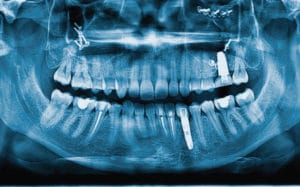Bisphosphonate Use Affects Success of Implant Therapy
A new study published in the November 2017 issue of the Journal of Oral Implantology found that women who take bisphosphonates (BPs) to prevent bone loss are at risk of implant failure.

A new study published in the November 2017 issue of the Journal of Oral Implantology found that women who take bisphosphonates (BPs) to prevent bone loss are at risk of implant failure. While dental implants are typically highly effective, the use of BPs changes the overall landscape of the mandible structure, impacting the success of implants. The paper, “Influence of Bisphosphonates on Implant Failure Rates and Characteristics of Postmenopausal Woman Mandibular Jawbone,” featured results of a Japanese study that focused on the use of BP therapy and its effect on the quality of the mandible. The researchers evaluated the bone mineral density and cortical bone thickness of the mandible, as well as how long-term BP therapy affected early implant failure.
The study included 25 women age 60 or older with a previous osteoporosis diagnosis and who underwent dental implant surgery in the mandible between January 2010 and March 2013. The patients were divided into two groups: a BP group of 11 patients who had been taking BPs for more than 1 year, and a nonBP group of 14 patients who had been prescribed a type of hormone therapy. The patients were compared using several computed tomography scans of their mandible to gauge bone mineral densities, cortical bone thickness, and the effect that the duration of BP therapy had on these two factors.The researchers found that in the BP group, three out of a total of 25 implants had failed in three patients within 1 year. In the nonBP group, a total of 28 implants had been placed and not one failed. The researchers concluded that the use of BPs negatively impacts the cortical bone in the partially edentulous posterior mandible of individuals with osteoporosis. They advise that oral health professionals should consider this when planning implant therapy. However, the study size was small and the researchers assert more investigation is necessary to confirm their findings.
From Dimensions of Dental Hygiene. February 2018;16(2):14-15.

